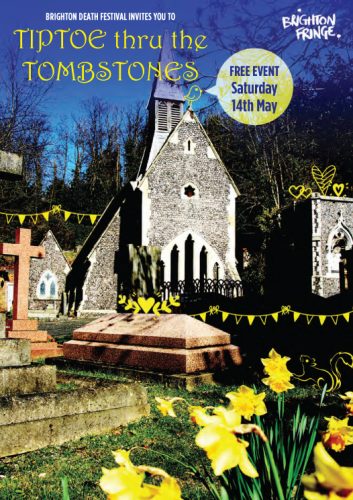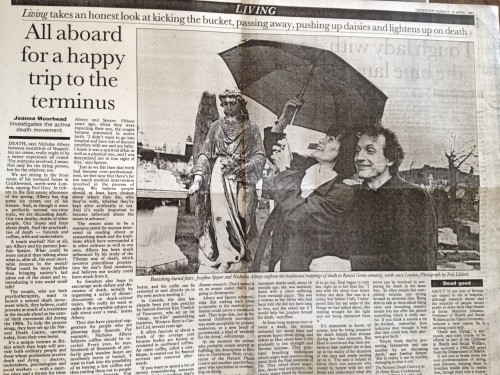Guest post by Lucy Coulbert, owner of Coulbert Family Funerals and The Individual Funeral Company.
Lucy’s been invited back to Westminster next week. And she’d like your thoughts about what she’s planning to say.
In the aftermath of the Support for the bereaved enquiry, I was not only contacted by a lot of media agencies, but I have also been invited to a meeting with Baroness Altmann next week along with a further meeting with the DWP.
It is my understanding that they will be talking about the issues that have arisen as part of this enquiry and are looking for recommendations on how to make claiming easier.
We have to be very clear that we are talking about funerals for people who are applying to the DWP for financial help. Our recommendations are outlined below.
The enquiry suggested there should be an online checker for people applying to the DWP for financial help paying for a funeral to see if they are eligible. I happen to think this is a good idea.
They also suggested a list of funeral directors should then appear based on postcode with their prices. While in practice this is a good idea, you will never get a like for like quote as funeral directors bundle their charges in very different ways. So one funeral director may charge for the removal fee and hearse fee in one lump sum and others itemise each cost. Therefore, if you don’t want a traditional hearse, you are still paying the same charge.
I think to appear on this website, a few things should happen. The funeral industry has got to agree on what a “simple” funeral should be and that every funeral director should give a price for those services only.
The second thing that should happen should be that funeral directors have the option of opting in or opting out at least twice a year. Therefore, if a national chain are particularly busy in December for example, there should be an easy way to take themselves off the DWP website so the family don’t have to wait weeks longer than they have to for a funeral.
The third point I will be making is that the payment system has simply got to be improved. My recommendation is that there has to be a facility for the funeral director to email their invoice and it should be paid within 14 days of receiving it. That way, we can book the day and the time of the funeral and the family doesn’t have to find the deposit.
The fourth is that there absolutely must be accountability. The report heard of families who after telling arrangers in national chains that they were applying to the DWP for help, were still presented with bills between £5,000 – £6,000.
If you have said you will undertake a “simple” funeral for £1800 for example and then present a bill of £5,000 I think it is fair that the company would be barred from advertising their services on a government website.
I have spoken to funeral directors up and down the country who agree that the following encompasses a “simple funeral” and doesn’t marginalise small funeral directors or home funeral directors.
Professional services
A coffin
Removal of the person who has died
Taking care of the person who has died
An estate car to take the person to the crematorium or cemetery on the day of the funeral
A service in the crematorium or a graveside service at the cemetery
The appropriate number of bearers on the day of the funeral
We also think that the minister’s fee (vicar/celebrant/humanist) should be a disbursement as not all families want someone to take the service and the family want to do this themselves.
We have said an estate car because not every funeral director owns their own, more traditional hearse and it seems to be a trend that traditional hearses aren’t in favour at the moment.
This is our definition of a “simple” funeral and is what we would be proposing to both the Baroness and DWP.
However, I would personally like to take things a step further in light of the growing problem with funeral poverty. I would like to propose a national minimum funeral cost for a simple funeral as outlined above.
While I am all for a free market, the general public haven’t any idea of what a funeral costs. If you are on a low income and not necessarily in receipt of benefits, then what do they do? Still get into debt because they have been presented with a £5,000 invoice?
By having a national minimum, again, funeral directors can opt in or opt out of undertaking funerals for xxx price but at least families would know who they can do to for a funeral that is affordable to them.
Again, there has to be accountability if a funeral director was on some sort database and still gives someone an over inflated bill.
By recommending a national minimum, I genuinely think the funeral industry has done all it possibly can to help the public. From then on, the onus is on them to do their research.
I’m not saying we shouldn’t charge a fair price for our bespoke services. I know I certainly do because of the level of work involved for a bespoke funeral. If funeral directors don’t make a profit, we won’t survive to help more families. However, we simply must offer the funeral we know is affordable to the family that is sat in front of us worrying about a bill for thousands.
There are amazing funeral directors around the country already doing this, but not all.
The Government are looking very closely at funeral directors pricing costs and we need to be proactive. If we aren’t, legislation will soon follow. In fact, I think it is inevitable that it will and it is closer than we think. If we don’t do something significant now, perhaps it will be taken out of our hands.
If Government are looking at legislation, pricing and regulation you can be assured that your future and your business is going to be in the hands of the NAFD and SAIF. It is my personal belief that if we don’t band together now, that these trade associations will possibly try to marginalise home funeral directors, those without their own hearses, funeral directors who don’t hold a Dip.Fd for example, but are amazing funeral directors.
So a few points then before I go into these meetings.
Am I on the right track with the DWP proposals?
How do you feel about a national minimum price?
Does my interpretation of a “simple funeral” marry with yours?
I will fight as hard as I possibly can to make sure the DWP system is easier for the people it was designed to help and we are paid a fair price for the work we do. I will also fight like a tiger against any legislation or regulation that marginalises the smaller funeral director or home funeral director but I am just one voice.
I already have a few behind me but how many more troops can we rally? If the only way we continue to have a voice and a seat at the table of these meetings, I will happily start a new funeral directors association….in fact, this is already in the pipeline and hope to tell you more about it next week.
An army of voices is always better than a lone one and I can’t keep talking for and on behalf of funeral directors like me if we aren’t all in it together.
So in the words of Susan B. Anthony – “Organize, agitate, educate, must be our war cry.”
What do you think?




